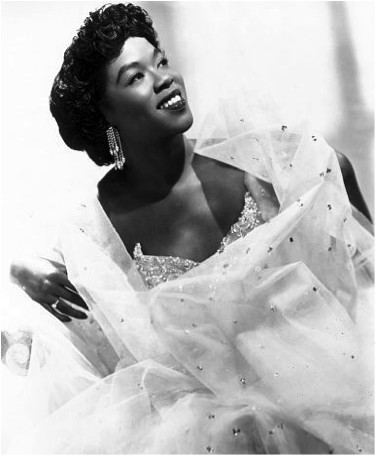The following post was written by Beth Fleming (Oklahoma City University), coordinator of the Music Library Association's Women in Music Round Table:
 Today we mark the 25th anniversary of the death of “the Divine One,” influential jazz singer Sarah Vaughan (March 27, 1924 – April 3, 1990.) Remarkably, her vocal career began as something of a fluke. She came from a religious family and while she sang in church as a child, she spent from 1931 to 1939 taking intensive piano lessons and becoming an accomplished pianist with no vocal training at all. During a trip to New York, she accompanied one of her friends at an amateur competition at the Apollo Theater and then later decided that she would go back to the competition as a vocalist herself. She sang and won the competition and shortly thereafter was brought to the attention of Earl Hines, who fired his male singer and hired Sarah—at the tender age of eighteen—to sing for his ensemble. Billy Eckstine soon broke away from Hines and began an orchestra of his own and Sarah Vaughan followed him and began her solo career. Eckstein and two of his stars, Charlie Parker and Dizzy Gillespie, were at the center of a new movement in jazz called Bop.
Today we mark the 25th anniversary of the death of “the Divine One,” influential jazz singer Sarah Vaughan (March 27, 1924 – April 3, 1990.) Remarkably, her vocal career began as something of a fluke. She came from a religious family and while she sang in church as a child, she spent from 1931 to 1939 taking intensive piano lessons and becoming an accomplished pianist with no vocal training at all. During a trip to New York, she accompanied one of her friends at an amateur competition at the Apollo Theater and then later decided that she would go back to the competition as a vocalist herself. She sang and won the competition and shortly thereafter was brought to the attention of Earl Hines, who fired his male singer and hired Sarah—at the tender age of eighteen—to sing for his ensemble. Billy Eckstine soon broke away from Hines and began an orchestra of his own and Sarah Vaughan followed him and began her solo career. Eckstein and two of his stars, Charlie Parker and Dizzy Gillespie, were at the center of a new movement in jazz called Bop.
Sarah Vaughan became one of the first singers to embrace this new style and to have the vocal virtuosity to incorporate the distinctive phrasing of Bop into her singing. She refused to be defined by any one style throughout her career, she sang jazz and popular songs as well as Broadway hits and arias.
Her voice was truly magnificent, and her four octave range, impeccably controlled vibrato and uncanny sense of pitch led to Vaughan's New York Times obituary describing her as a "singer who brought an operatic splendor to her performances of popular standards and jazz."
- Facebook Like
- Auf Facebook teilen
- Zum Verfassen von Kommentaren bitte Anmelden.

